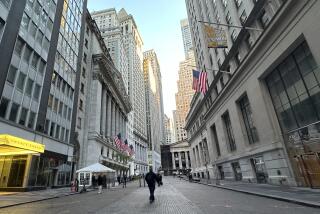Stocks Rebound Slows, but Dow Tops Record
NEW YORK â The stock market ran out of steam Tuesday following a robust two-day rally, although it managed to slightly extend the previous sessionsâ gains and push the Dow Jones industrial average to a new record high and closer to the vaunted 2,000 mark.
The Dow Jones average of 30 industrials rose 3.51 to 1,974.83, topping the previous closing high of 1,971.32 set on Monday.
The closely watched index soared 44.01 points in that session, surpassing the previous record one-day point increase of 43.41 points set on Nov. 3, 1982. On Friday, the industrial average rose 31.36 points.
Gainers outpaced losers by about seven to five on the New York Stock Exchange. Big Board volume totaled 189.30 million shares, compared to 181.85 million on Monday.
âThe market seems to be backed off a touch, which seems to be a healthy development,â said Hildegarde Zagorski, a market analyst with Prudential-Bache Securities.
âItâs better that we go slow and steady,â she added.
Some Profit Taking
Traders said the market failed to surge ahead Tuesday due in part to some profit taking among investors, a weak bond market and the dollarâs poor performance on world currency exchanges.
Robert Malcolm, a market analyst with Laidlaw, Adams & Peck, said: âThereâs widespread belief that thereâs going to be some kind of market correction sometime in January.â
And looking ahead: âWhen you have a couple of very strong days--as we just had--some people would take that as an opportunity to sell,â he said of Tuesdayâs profit taking.
Prices of the bellwether 30-year Treasury issues were off about point, or $2.50 per $1,000 face amount, on Tuesday, with the yield rising to 7.35% from 7.33% on Monday. The dollar fell against most major currencies in worldwide exchanges.
âRight now, we need something to push the (stock) market even further, such as a reduction in interest rates or a (positive) change in the economic outlook,â added Mary Farrell, a stock market analyst for Paine Webber Inc.
When interest rates fall, stocks become a more attractive investment over bonds.
Traders had attributed the two-day rally in part to the end of traditional year-end tax-selling pressures, which were especially acute in 1986 due to changes in the tax law which took effect Jan. 1.
Investors who sold their stocks last year to deduct losses and take advantage of tax benefits for capital gains were now pouring their money back into the stock market, traders said.
Among those on the NYSEâs most-active list were several blue-chip stocks, including: International Business Machines, down 5/8 to 123; American Telephone & Telegraph, down 1/8 to 25 1/2; American Express, up 1 to 60 3/4, and Sears, Roebuck, up 1 5/8 to 43 5/8.
Large blocks of 10,000 or more shares traded on the NYSE totaled 3,980, compared to 3,594 on Monday.
Standard & Poorâs index of 400 industrials rose 0.74 to 281.69, and S&P;âs 500-stock composite index was up 0.59 to 252.78.
Quiet Bond Trading
In the bond market, prices were little changed in quiet trading Tuesday.
Prices for corporate and municipal bonds were higher.
âIt was a terribly uninspiring day,â said Mitchell Held, an economist with Smith Barney, Harris Upham & Co., noting that trading was thin and there was little movement in the credit market.
Traders were waiting for data, including unemployment figures to be released Friday, that will indicate what direction the economy would take, Held said.
Investors generally view bearish news about the economy as good for the bond market because it could prompt the Federal Reserve Board to stimulate the economy by easing credit restrictions. Bond prices and interest rates move inversely.
Held said traders also were waiting for the usual January weakening of the federal funds rate, the interest on overnight loans between banks.
Fed funds traded at 6.25%, down from Mondayâs 6.75%.
In the secondary market for Treasury bonds, prices of short-term governments were unchanged to 1/32 higher, intermediate maturities ranged from 1/32 point higher to 3/32 point lower and long-term issues were down 1/16 point, according to figures provided by Telerate Inc.
Industrials Advance
The movement of a point is equivalent to a change of $10 in the price of a bond with a $1,000 face value.
In corporate trading, industrials rose 3/8 point in moderate trading and utilities were up point in moderate trading, according to the investment firm of Salomon Bros.
Among tax-exempt municipal bonds, general obligations were unchanged and revenue bonds were up point, Salomon Bros. said. Trading was light.
Yields on three-month Treasury bills were down 3 basis points to 5.48%. A basis point is one-hundredth of a percentage point. Six-month bills fell 5 basis points to 5.48% and one-year bills fell 5 basis points to 5.48%.
More to Read
Inside the business of entertainment
The Wide Shot brings you news, analysis and insights on everything from streaming wars to production â and what it all means for the future.
You may occasionally receive promotional content from the Los Angeles Times.










